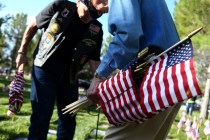Chance to build better friendships worth risks
Semantics (the meaning of a word or sentence) is critical to truth, justice and our everyday life. If we don't understand what is stated and how it is meant, our ability to communicate goes right out the window.
Blessing, friend, happiness, worth — words, denotations of symbols, semantics.
A blessing can be something that brings us joy or a prayer on the food before devouring the Thanksgiving meal. A friend can mean a playmate or a political ally. Happiness can be euphoric or mere satisfaction. Worth has both monetary and character connotations. Semantics: to communicate we must understand what is meant.
The semantics of Thanksgiving helps us understand the evolution of our nation. The words pilgrim, puritan and freedom swirl through Thanksgiving teachings from kindergarten to adulthood. But what do these words really teach us about the birth of America?
Correctly defined, pilgrim is "an original settler in a region," but nearly every school history book makes the mistake of teaching a pilgrim as "one of the band of Puritans who founded the colony of Plymouth in 1620."
Wrong! The Plymouth Pilgrims were never part of the Puritan band. So often confused with others from their era, the Plymouth Colony Pilgrims are a misunderstood group. They had expectations, contributed to every American's life, and semantics are crucial in understanding the Pilgrims' role.
The Plymouth Pilgrims expected their voyage to take 65 days. Instead it took 122 days before the New World was sighted and another 29 days before they actually set foot on what became Plymouth Colony.
Their destination was Virginia Colony, part of the king's empire, grantees protected under English law; instead they landed far north on a shore outside England's jurisdiction. Their landing left them suddenly lawless, open to the dangers and opportunities of a government waiting to be born.
They fled England to embrace religious freedom and instead felt the long arm of the king's church reach across the sea to strangle that freedom.
The Plymouth Colony Pilgrims were religiously tolerant, nonconformists. They had separated themselves from the Church of England and were called Separatists. They were not Puritans.
Puritans came 10 years later, settling Massachusetts Bay Colony. They were religiously intolerant extremists, aligned with the Church of England and the harsh persecuting practices of the King. Church and state were one, and only one church was permitted by the king. For attending the Pilgrims' congregational Sunday services, rather than the Puritans' Church of England, Pilgrims were imprisoned, or worse, by the Puritans.
England, Massachusetts Bay Colony and Virginia Colony had, respectively, 31, 13 and 17 capital crimes. Plymouth Colony had only five and enacted only two. The Puritan colonies made it a felony to worship outside of the Church of England; the Pilgrims embraced all faiths, remembering the persecution they had endured in England and Europe. While the Pilgrims lived and let live, the Puritans joined in witch hunts.
Freedom of religion on the newly colonized eastern shores of the New World hung in the balance. New York excluded Roman Catholic priests — on pains of death; Rhode Island followed suit. New Hampshire persecuted the Quakers; Connecticut followed sway. The thread of religious freedom stretched nearly threadbare.
Eventually, the more tolerant spirit of the Pilgrims supplanted the Puritans' harsh cruelties, but it took generations for religious freedom to become the stalwart of the Colonies.
How did tolerance take hold? Friendship, communication, time, patience and endurance. Squanto befriending the Pilgrims. William Bradford (Plymouth Colony governor) working with Roger Williams (founder of Rhode Island). Respecting each other's right to live their beliefs — without the threat of prison, flogging, hanging or worse.
The men and women who settled Plymouth Colony, Massachusetts Bay and New Amsterdam were not perfect. The New World was a risky undertaking. Those who brought their culture and beliefs to the New World were aware of the risks, but to them the reward, if achieved, was worth it. They had to bend, and plant, and allow the beliefs and culture of others to swirl around them. They adopted what they respected and held tight to what was crucial for them. Finally, the right of religious freedom was conceived, then birthed.
As a nation, we are barely in our adolescence and in that stage of our existence, which course will we follow: pilgrim or puritan? Until we stop expecting the impossibility of perfection from others and ourselves, individual or by nation, happiness will forever elude us.
Today, whether with friends or those we do not know, we need to see the worth of one another and of ourselves. We need to stop belittling ourselves and our nation and refrain from ridiculing others. What became America, the land of the free, began as a desperate attempt to live and let live. It's most successful colony had the fewest laws and was the most open and tolerant society.
We have much we can gain by learning from the wisdom of our forefathers and foremothers. This season, may we each be grateful for what we have, honor the risk and sacrifice lived by those who planted the seeds of our nation, and exercise those same qualities to build friendship and respect across religious, political and geographic lines so we, like the builders of our nation, may leave the world a better, more tolerant world.
It's a risky undertaking, but it is definitely worth the risk.
Cat Trico has been a resident of Boulder City since 2003 and is a past president of the Senior Center of Boulder City and co-founder of the Decker Lake Wetlands Preserve. As an author and editor, she contributed to "Rights, Responsibilities, and Relationships" for youth. She can be reached at cat.circa1623@gmail.com.



